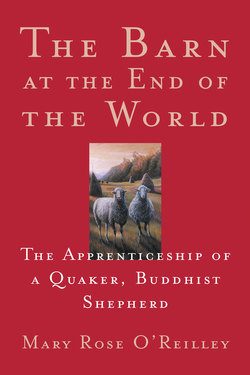Читать книгу The Barn at the End of the World - Mary Rose O'Reilley - Страница 28
На сайте Литреса книга снята с продажи.
ОглавлениеIs It Necessary to Have a Plow?
THIS MORNING I sheared a Suffolk ewe with a bad attitude. I still have a hard time catching sheep, never mind shearing them. I chased four ewes around the pen for half an hour until suddenly one went down on its knees in the corner, terrified not by me but by the sound of Ben on his Bobcat cleaning out the pens at the north end of the barn. Even at that, I could not get her onto the stand. Ben had to strap her in for me. But I managed to shear her without taking off any body parts. I few weeks ago Ben asked me to paint a sign for the sheep barn at the state fair and I have been working at that back home on my kitchen table. Today I discovered that hours spent drawing sheep paid off in practical knowledge of what curves lay under the wool: it improved my shearing.
I took her off the stand and she booked away, jumped the fence, and tore off down the pasture. I spent the next hour trying to head her out and pen her again. A huge Simmental bull residing in the barn for the state fair watched us with an expression of vast disdain.
Ben, interested in all trades, wants to know why I’m a writer. “What do you write about?” he asks as we curry another lovely Dorset.
What did Montaigne say? “Myself.” Writing essays, writing poetry, is a solipsistic occupation, much harder to justify than sheep farming. But I wanted to answer Ben’s question as conscientiously as he answers mine. Our lives and backgrounds have brought us to different choices, but we’re transacting the same private business, he and I. At the beginning of Terre des Hommes, Antoine de Saint-Exupery says, “A man discovers himself when he measures himself against an obstacle. But, in order to pay attention, he has to have a tool, a plow or…” a Bobcat or a pen. “Just now, I’m writing about work, and how people experience their lives spiritually,” I said.
“Why?”
“Well, in a way, to get a grip on what I feel and know. It’s only after I’ve written about something that I see patterns, bring things to light.” In one of her poems, “The Chance to Love Everything,” Mary Oliver speaks of something outside her tent, “pressing inward at eye level.” Strange and mysterious things press on the tent of consciousness. I want to bring them in where I can love them, or at least acknowledge them mine.
Comb. Comb. Comb. Farming is one of the few remaining reflective occupations. It’s inward, solitary, and yet social. “If they don’t do chores together, how does a man talk to his boys?” wondered my friend Conor, a dairy farmer with a small herd. After he said that to me, I went home and got rid of the dishwasher (somewhat to the chagrin of my children). When I look for an image of the writer’s life, I remember Conor on his knees in the dairy barn, his long listening look as he monitored the milking machine. Writing would be merely an act of crazy hubris were it not a means of discovery, cunning and patient.
“What if I carve some speed lines in this guy’s wool, or maybe the barn logo?” I wanted to know.
“I’d say, if you do that we’ll lose show points.”
